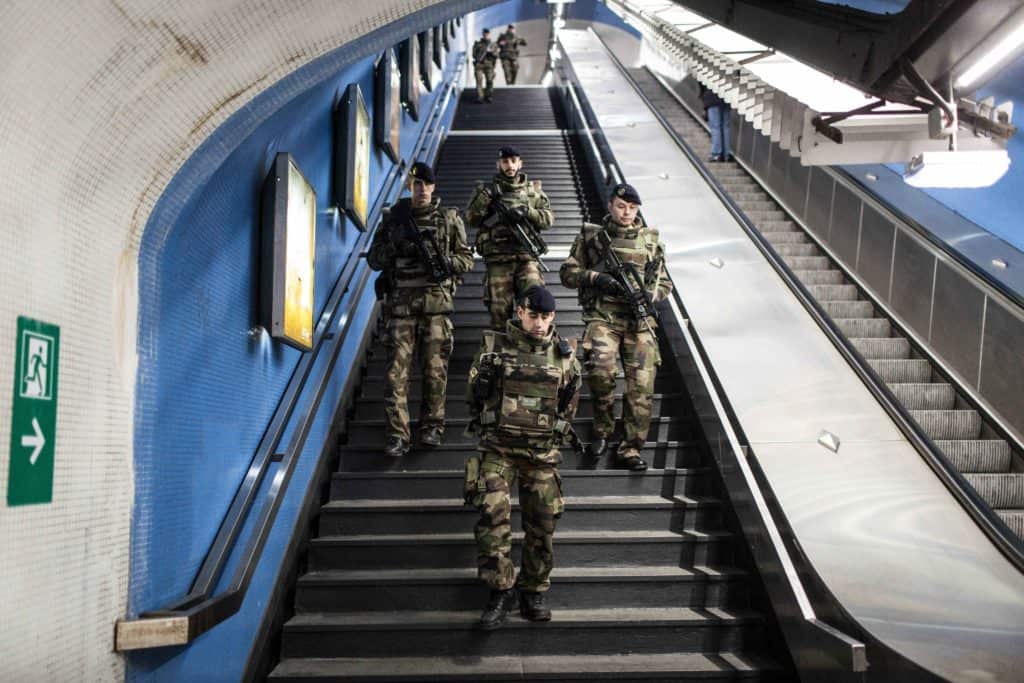France’s Terror Threat Hasn’t Gone Away
Gavin Mortimer, Spectator, August 9, 2017

French soldiers patrol a Paris metro station. (Credit Image: © Imago via ZUMA Press)
The latest attack in France couldn’t have come at a worse time for the government. On Tuesday night, Prime Minister Édouard Philippe and his ministers dined at the Élysée Palace as the guests of their president, a “moment of conviviality” before they all head off on holidays today. It’s been a trying few weeks for them, what with Emmanuel Macron’s plummeting popularity amid a series of PR disasters for his inexperienced En Marche! party and a spot of R&R is just what everyone needs. Instead, this morning brought news of yet another outrage in the French capital.
Fortunately, casualties were light. Of the six soldiers struck by a BMW outside their barracks in the western suburb of Levallois-Perret, two are reportedly in a serious condition. The driver of the vehicle escaped on foot but, according to the latest reports, has been arrested on the A16 motorway heading in the direction of Calais after a police shootout in which he was wounded.
Although the reason for the attack remains unknown, the mayor of Levallois-Perret, Patrick Balkany, said “without any doubt it was a deliberate act”. It would be a surprise if it wasn’t the latest in a string of Islamist attacks to strike France.
As recently as Saturday, an 18-year-old was arrested at the Eiffel Tower as he waved a knife and shouted “Allahu Akbar”. Described by police as a young man with a history of psychological trouble, he apparently wanted to kill a member of the security services. This has been the aim of many Islamists this year in Paris – from the man who attacked a female soldier at Orly airport, to the Egyptian who was shot in the Louvre as he aimed a machete at a soldier, to the terrorist who died attempting unsuccessfully to blow up a police van on the Champs-Élysées.
There have been other incidents, too, including the murder of a policeman in April, three days before the first round of the presidential election. The death of Xavier Jugelé on the Champs-Élysées was a grim reminder that while it’s now more than a year since a mass casualty attack in France, the Islamist threat is as great as ever – a point acknowledged at the weekend by Gérard Collomb, the Home Secretary, in an interview with Journal du Dimanche.
Explaining that 217 adults and 54 minors have returned to France from Isis’s heartlands in Iraq and Syria, Collomb said some of them have already been incarcerated. He also said that all will be subjected to legal proceedings. Yet all the same, conceded Collomb, “there exists other threats” – not least the 18,500 people who have been flagged as potential security concerns.
That’s a statistic to spoil the holiday of any government minister. The French security services are doing sterling work in dismantling terrorist cells – seven this year, according to Collomb – but faced with such a huge number of potential suspects how can they be expected to keep ahead of the game all the time?
Collomb reiterated in his interview President Macron’s pledge to recruit 10,000 more police and gendarmes in the next five years – despite the cuts to public spending that the government is promising to make – but the real challenge to the French authorities, as it is their counterparts in Britain, is how to tackle the spread of the Islamists’ toxic ideology.
The last French government thought they had the answer: a deradicalisation centre housed in the Château of Pontourny in the Loire where young men “on the path to radicalisation” would be sent to learn the errors of their ideology. The centre opened in September last year and was, in the words of Le Figaro ‘a fiasco’. Last month, the centre closed its doors for good having wasted 2.4m euros.
Admitting the failure of the scheme, Muriel Domenach, general secretary of the committee for radicalisation, urged the government to come up with another idea, warning that radicalisation is growing in France with more than 2,600 young people being monitored by her organisation.
This is the fear in France. After Mohammed Merah went on his murderous rampage in March 2012, killing seven people, including three Jewish children, there were no more attacks until the Charlie Hebdo slaughter of 2015. But in the interim, the Islamists had embedded a terrorist network from Brussels to Paris and the concern now is that they are reestablishing these networks ready for a fresh wave of bloodshed using a new generation of killers.















